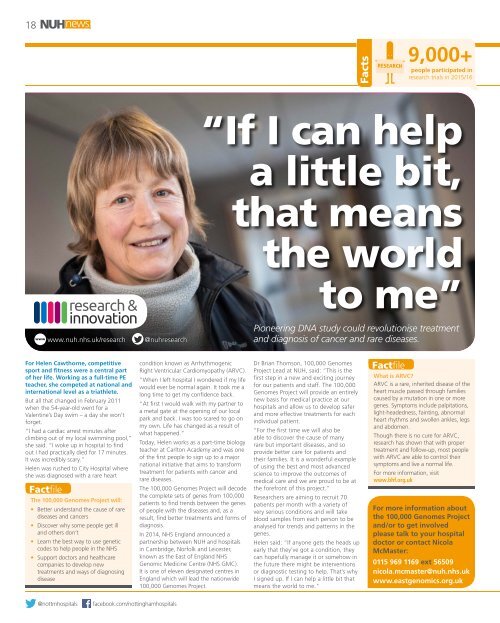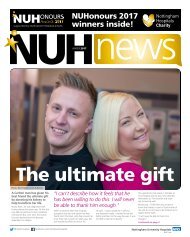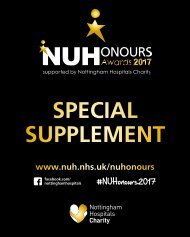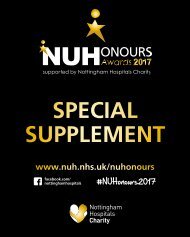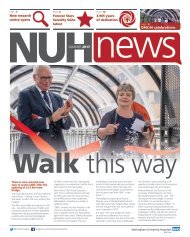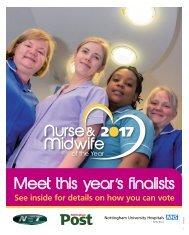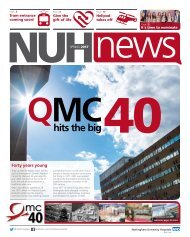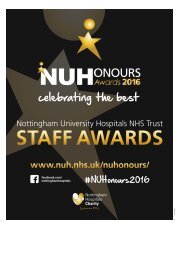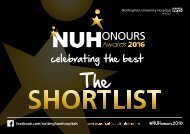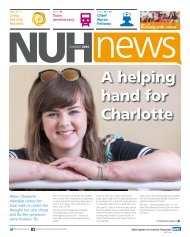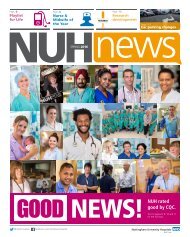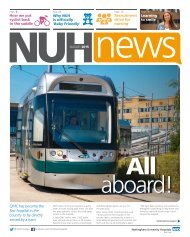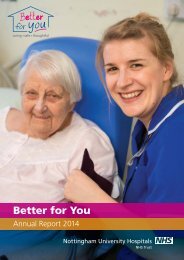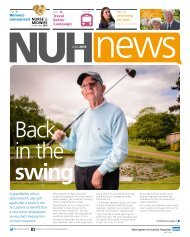NUH News SPRING 2016 Online
You also want an ePaper? Increase the reach of your titles
YUMPU automatically turns print PDFs into web optimized ePapers that Google loves.
18<br />
Facts<br />
RESEARCH<br />
9,000+<br />
people participated in<br />
research trials in 2015/16<br />
“If I can help<br />
a little bit,<br />
that means<br />
the world<br />
to me”<br />
www.nuh.nhs.uk/research<br />
@nuhresearch<br />
Pioneering DNA study could revolutionise treatment<br />
and diagnosis of cancer and rare diseases.<br />
For Helen Cawthorne, competitive<br />
sport and fitness were a central part<br />
of her life. Working as a full-time PE<br />
teacher, she competed at national and<br />
international level as a triathlete.<br />
But all that changed in February 2011<br />
when the 54-year-old went for a<br />
Valentine’s Day swim – a day she won’t<br />
forget.<br />
“I had a cardiac arrest minutes after<br />
climbing out of my local swimming pool,”<br />
she said. “I woke up in hospital to find<br />
out I had practically died for 17 minutes.<br />
It was incredibly scary.”<br />
Helen was rushed to City Hospital where<br />
she was diagnosed with a rare heart<br />
Factfile<br />
The 100,000 Genomes Project will:<br />
• Better understand the cause of rare<br />
diseases and cancers<br />
• Discover why some people get ill<br />
and others don’t<br />
• Learn the best way to use genetic<br />
codes to help people in the NHS<br />
• Support doctors and healthcare<br />
companies to develop new<br />
treatments and ways of diagnosing<br />
disease<br />
condition known as Arrhythmogenic<br />
Right Ventricular Cardiomyopathy (ARVC).<br />
“When I left hospital I wondered if my life<br />
would ever be normal again. It took me a<br />
long time to get my confidence back.<br />
“At first I would walk with my partner to<br />
a metal gate at the opening of our local<br />
park and back. I was too scared to go on<br />
my own. Life has changed as a result of<br />
what happened.”<br />
Today, Helen works as a part-time biology<br />
teacher at Carlton Academy and was one<br />
of the first people to sign up to a major<br />
national initiative that aims to transform<br />
treatment for patients with cancer and<br />
rare diseases.<br />
The 100,000 Genomes Project will decode<br />
the complete sets of genes from 100,000<br />
patients to find trends between the genes<br />
of people with the diseases and, as a<br />
result, find better treatments and forms of<br />
diagnosis.<br />
In 2014, NHS England announced a<br />
partnership between <strong>NUH</strong> and hospitals<br />
in Cambridge, Norfolk and Leicester,<br />
known as the East of England NHS<br />
Genomic Medicine Centre (NHS GMC).<br />
It is one of eleven designated centres in<br />
England which will lead the nationwide<br />
100,000 Genomes Project.<br />
Dr Brian Thomson, 100,000 Genomes<br />
Project Lead at <strong>NUH</strong>, said: “This is the<br />
first step in a new and exciting journey<br />
for our patients and staff. The 100,000<br />
Genomes Project will provide an entirely<br />
new basis for medical practice at our<br />
hospitals and allow us to develop safer<br />
and more effective treatments for each<br />
individual patient.<br />
“For the first time we will also be<br />
able to discover the cause of many<br />
rare but important diseases, and so<br />
provide better care for patients and<br />
their families. It is a wonderful example<br />
of using the best and most advanced<br />
science to improve the outcomes of<br />
medical care and we are proud to be at<br />
the forefront of this project.”<br />
Researchers are aiming to recruit 70<br />
patients per month with a variety of<br />
very serious conditions and will take<br />
blood samples from each person to be<br />
analysed for trends and patterns in the<br />
genes.<br />
Helen said: “If anyone gets the heads up<br />
early that they’ve got a condition, they<br />
can hopefully manage it or somehow in<br />
the future there might be interventions<br />
or diagnostic testing to help. That’s why<br />
I signed up. If I can help a little bit that<br />
means the world to me."<br />
Factfile<br />
What is ARVC?<br />
ARVC is a rare, inherited disease of the<br />
heart muscle passed through families<br />
caused by a mutation in one or more<br />
genes. Symptoms include palpitations,<br />
light-headedness, fainting, abnormal<br />
heart rhythms and swollen ankles, legs<br />
and abdomen.<br />
Though there is no cure for ARVC,<br />
research has shown that with proper<br />
treatment and follow-up, most people<br />
with ARVC are able to control their<br />
symptoms and live a normal life.<br />
For more information, visit<br />
www.bhf.org.uk<br />
For more information about<br />
the 100,000 Genomes Project<br />
and/or to get involved<br />
please talk to your hospital<br />
doctor or contact Nicola<br />
McMaster:<br />
0115 969 1169 ext 56509<br />
nicola.mcmaster@nuh.nhs.uk<br />
www.eastgenomics.org.uk<br />
@nottmhospitals<br />
facebook.com/nottinghamhospitals


